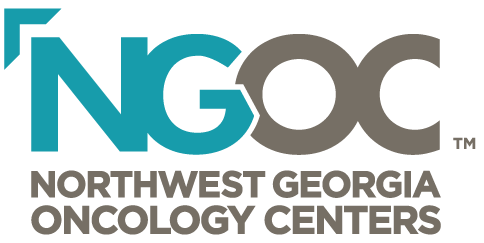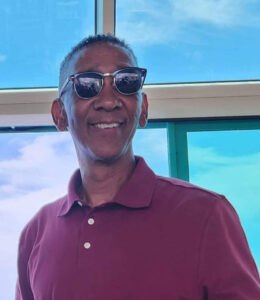Semper Fortis (Always Courageous)
The promising high school football star recruit, Timothy Ratliff, had a confrontation with his new college coach at spring training practice that landed him at military boot camp the following week. With a slip of the tongue, Ratliff traded his football uniform for a sailor suit.
Now retired after 20 years of service, former Naval Petty Officer Ratliff’s biggest battle wasn’t on a football field or on armored ships deployed in Iran and Afghanistan. It was fought at Wellstar/Northwest Georgia Oncology Centers’ (NGOC) Marietta cancer center at Wellstar Kennestone Hospital.
Complications post-hernia surgery sent Ratliff to the ER in 2017. An X-ray ensured a blood clot hadn’t traveled to his lungs, but it revealed something just as life-threatening – stage 4 lung cancer. At age 45 Ratliff’s immune system cells, called T cells, had lost their ability to distinguish between friend or foe allowing the cancer to grow and spread.
Since retiring from the Navy in 2011, Ratliff spent six years working six-month assignments away from home as an international military contractor charged with bunker storage of ammunition and explosives for all branches of service.
“I was the foreman ensuring ammo was safely stored by compatibility and weight. There was a lot at stake because certain weapons and explosives don’t belong together, or they will blow up,” said Ratliff. “Looking back, I see the analogy of what I did and what I’ve gone through. My body was waging war on itself. The cancer was causing my body to experience the thing I was working to prevent on military bases – death and destruction.“
Four days after that serendipitous ER visit and without experiencing any symptoms of metastasized cancer, Ratliff started chemotherapy, radiation, and immunotherapy. “Three months after starting treatment, the tumor had shrunk so much Dr. McCune was amazed,” said Ratliff. “In spite of that good news, we remained vigilant in treating my advanced-stage cancer with the same fighting spirit I pledged to have as a Sailor.”
The Mississippi native’s days as an overseas contractor were over as cancer treatment required him to be close to Wellstar/NGOC’s Marietta cancer center. For his sake and for others diagnosed in the future, Ratliff agreed to enter Wellstar/NGOC’s clinical trial program to take an active role in helping NGOC’s cancer doctors find out if study drugs alone, or in combination with other treatments, help fight cancer. Wielding an advanced cancer treatment called immunotherapy as the weapon, Marietta-based Oncologist Dr. Steven McCune enrolled Ratliff to fight his metastasized lung cancer with a vengeance.
As part of Ratliff’s participation in the clinical trial, Dr. McCune used checkpoint inhibitors – “the foundation of current immunotherapy” – to mobilize and boost Ratliff’s immune system to target and kill the cancer. Ratliff’s combination of checkpoint inhibitor medications given intravenously stops cancer cells from targeting proteins on T cells to disable them from attacking the body the immune system was designed to protect from harm.
They say Navy men and women don’t give up the ship. That’s true for Ratliff as he remains under Dr. McCune’s care and available to anyone in his sphere of influence. With the heart of a soldier and the zeal of a preacher his late mom was convinced he’d become, Ratliff talks about his life with gratitude and appreciates all the places he’s been, even the inside of an infusion room.
As Ratliff’s immunotherapy treatments stretched to three-week intervals, the now long-haul truck driver can “clear his mind, think and encourage friends struggling with life or health issues” on his dedicated Southeastern corridor route.
“Sometimes I catch myself crying as I think about my journey, my family or a friend’s struggle with the loss of health or a family member,” said Ratliff. “I hope to be as caring to people in my life as Dr. McCune is to me, but I don’t pretend to know how other people feel anymore. Everyone’s different. I just say, ‘I’m here if you need me.’”
Spoken like a true shipmate.


